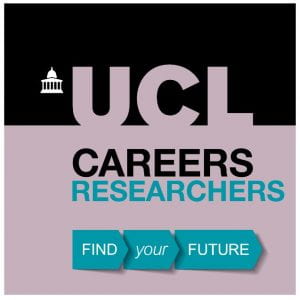Welcome to Careers in Communication & Research
By uczjipo, on 29 January 2020
Communication & Research Month
Interested in being on the other side of research? Making it readily available and easily digestible to the public? A career in communication could give you the opportunity to support research. Maybe you want to carry on in research for a non-academic organisation? Social and market research organisations are a great space to utilise your research skills in a business context.
If you’re interested in supporting research through communications or completing social or market research yourself, this month of events is for you!
Thinking about attending but not sure if it’s for you?
Come along if you want to learn more about how to use communications in a career or just hear from speakers with research and PhD backgrounds who have transitioned out of academia. Do you enjoy communicating your research to an audience of non-researchers, sharing findings with your audience and keeping up to date with latest in your field? A career in communication could allow you to expand the reach of your research and support an organisation to grow in so many different industries.
If you want to transition out of academia but still support research, come along to our sessions and hear how this is possible with these careers.
Here’s what’s coming up…
Check out the events coming up this month and learn more about this industry.
Careers in Communication Forum
Thurs 6 Feb, 5.30-7.30pm
Interested in being on the other side of research? Making it readily available and easily digestible to the public?
Research skills are key to this including disseminating complex information effectively, understanding the wider context of results and the personal applicability of findings.
This forum will give you the opportunity to get an insight into the Communications sector from PhD level speakers who have paved a career for themselves in this industry. Find out more about what a career in communication encompasses, the wide range of industries and specialisms this covers and gain tips on how to find a researcher role.
Speakers include:
Nikolay Nikolov: Senior Producer – Mashable: a global, multi-platform media and entertainment company
Nikolay Nikolov is a senior producer at Mashable. Over the past three years, his work has helped guide Mashable’s video coverage, with a particular focus on the intersection of human rights and technology. His recent documentary about ‘Drag Syndrome’, the world’s first drag troupe featuring artists with Down Syndrome, was selected by a number of international film festivals, including Sofia Pride, Oska Bright, and Queer Bee. Before Mashable, Nikolay was a producer for AJ+, responsible for the coverage of the refugee crisis in Europe.
Key tip: don’t get pigeonholed by your research
Kotryna Temcinaite: Research Communications Manager – Breast Cancer Now: The UK’s largest breast cancer charity
Kotryna is the Research Communications Manager at the research and care charity Breast Cancer Now. Breast Cancer Now is the UK’s first comprehensive breast cancer charity with the goal that by 2050 everyone diagnosed with the disease will live and be supported to live well. Kotryna leads a team of three science communicators and an insight analyst. Her team is responsible for providing content, information and insight on breast cancer research and statistics. Their aim is to bring it to life in creative and compelling ways for non-scientists.
Key tip: take time to distil what they’re passionate about
Employer Taster Session in Communication
Tues 11 Feb, 12.30-2pm
This session has been postponed – please check back for further details
Careers in Social & Market Research Forum
Weds 12 Feb, 5.30-7.30pm
Want to carry on in research for a non-academic organisation? Social and market research organisations are a great space to utilise your research skills in a business context.
If you’re interested in staying in a research role which supports organisations to understand their audiences better or to be involved in producing social statistics which effect governmental change, this panel is for you! This forum will give you the opportunity to get an insight into the non-academic research sector from PhD level speakers who have paved a career for themselves in this industry. Find out more about what a career in social and market research encompasses, the wide range of industries and specialisms this covers and gain tips on how to find a researcher role.
Speakers include:
Piotrek Gierszewski: Senior Researcher – Nesta Challenges: This team design challenge prizes that help solve pressing problems that lack solutions
Piotrek is a Senior Researcher passionate about the application of foresight and horizon scanning; exploring possible visions for the future, anticipating obstacles and enabling the desirable opportunities to happen. He currently works at Nesta, an independent innovation foundation, and has over ten years’ experience in research within academia, private and non-profit sectors.
Piotrek is responsible for researching social and environmental problems and identifying opportunities to tackle them as part of the Nesta Challenges team. They specialise in developing challenge-driven, open-innovation competitions that support communities of solvers and incentivise solutions to these problems. Since 2017, Piotrek has worked on topics ranging from emerging innovations in whale conservation and legal technologies, to scaling up access to nutrition and surgical services in low resource settings.
Research Director – NatCen Social Research: Britain’s largest independent social research agency
What else can you do to get career ready?
Alongside this, we have a team of careers consultants with research backgrounds who work closely with UCL’s researcher community and can provide support regardless of whether you’re looking to continue in academia or explore other options. Our “Researcher appointments” can be booked at any time through your myUCLCareers account and can be used to cover a range of queries from exploring options to getting support with applications/interview preparation. The careers consultants also run separate workshops covering a range of topics on academic and non-academic career routes for researchers.
Details of the full events programme can be found here
 Close
Close







